ULOGA UDŽBENIKA MATERINSKOGA JEZIKA U PROCESU DEMOKRATIZACIJE ŠKOLE
ROLE OF MOTHER TONGUE TEXTBOOKS IN PROCESS OF DEMOCRATIZATION OF SCHOOLS
Author(s): Ivana OdžaSubject(s): Croatian Literature, South Slavic Languages, School education, State/Government and Education, Pedagogy
Published by: Filozofski fakultet Univerziteta u Sarajevu
Keywords: democracy; democratism; elementary school; mother tongue textbooks;
Summary/Abstract: The subject of the paper is the analysis of a series of mother tongue textbooks (Croatian) for 4th grade of elementary school published by editor Školska knjiga. Relying on the quality of the teaching staff’s choice and considering the fact that the textbook is still the dominant didactic material in elementary school the expectation is that the supplied content is in accordance with the postulates of the National Education Curriculum. The reform strategy as a whole is based on the requirements and demands of (co)existence in a democratic society. The goal of this paper is to determine the degree to which the selected philological templates meet the demands of the basic concepts of education policies, regarding specifically the democratization of schools, which is the starting point of the National Education Curriculum of the Republic of Croatia. The fundamental question, therefore, is whether the selected linguistic and literary texts supply a sufficient basis for the development of a democratically conscientious student in the first years of education, keeping in mind the concept of democracy and democratism and the dangers of it being twisted into an autocracy, and consequentially forming the student’s value system accordingly. On the topic of forming a value system the author touches upon the intersections between tradition and democracy and their mutual influences on one another. In elementary school education mother tongue classes, in accordance with the cognitive and emotional capacities of the recipient (the student), the minimalized literary-theoretical interpretation is compensated for by focusing on the development of the student’s emotional, perceptual and moral capacities. The assumption is that a skilled teacher is able to develop fully the student’s democratic concept of thinking, especially given the right selection of literary examples that will allow for maximum engagement.
Journal: Zbornik radova Odsjeka za pedagogiju
- Issue Year: 2/2018
- Issue No: 2
- Page Range: 134-151
- Page Count: 18
- Language: Croatian

